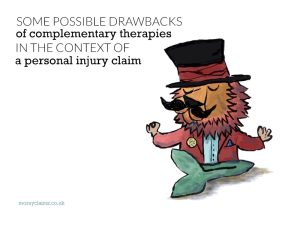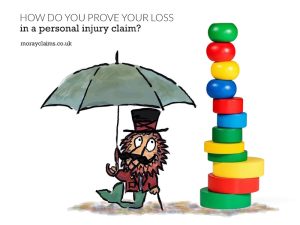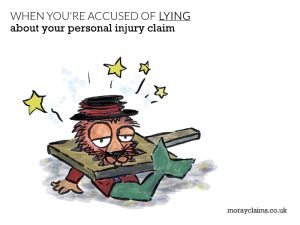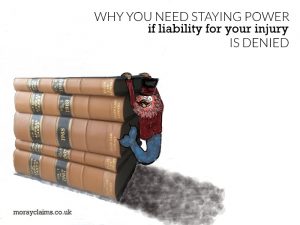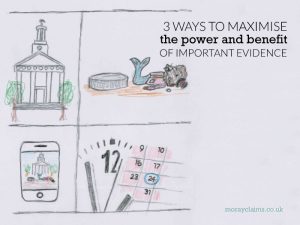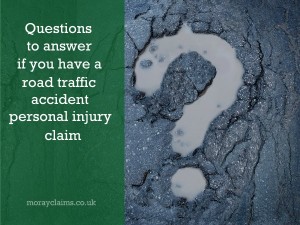In 2007, I was diagnosed with Lyme Disease, a bacteriological infection you get from deer ticks. Some of the main symptoms were tiredness , lethargy and “brain fog”. I was treated with antibiotics over a period of about 9 months, some oral, some intravenous. I recovered but had some annoying residual symptoms, including neck stiffness and pain. I tried a treatment from complementary medicine, called craniosacral therapy, through Healthworks in Forres, and got a lot of benefit from it. I consider my recovery was due to a combination of conventional and complementary medicine. I am a believer in the benefits of complementary therapies. But I relied primarily on conventional medicine and at all times after I had been diagnosed by my GP and referred for expert opinion, I was under the care of a consultant in the Infectious Diseases department of Aberdeen Royal Infirmary. Complementary therapies have a lot of advantages but in the context of a personal injury claim Continue Reading
How do you prove your loss in a personal injury claim?
What are the things you must do to prove your loss - and to minimise your loss - in a Personal Injury Compensation Claim? How easy is it to value a personal injury compensation claim? In theory, working out the value of your personal injury claim should be straightforward. What your solicitor needs to do is make a comparison between two possible factual scenarios: Both of these key elements are estimates or projections, to some extent. Both will carry uncertainties, to a greater or lesser extent. There are two important things to bear in mind when comparing "your life as it is in fact" (with the accident) with "your life as is should have been" (without the accident). Let's look at each of these in turn. 1. Did the accident cause the loss you are trying to claim. In some instances, this will be “obvious”. For example, if your accident did not cause any injury to your wrist, a claim for physiotherapy costs incurred in relation to the wrist will fail Continue Reading
When you are accused of lying about your personal injury claim
Traditionally, age brings with it wisdom – and the respect of others. But what if you’re 84 years old and you’re accused of telling lies "in court"? It's one thing to exaggerate, for example, medical symptoms caused by an accident - but to invent them? Here's an anonymised true story of a case we dealt with and how a scenario of that nature played out in practice. Our client was injured after she fell into an excavation that had been made by a national utilities company. It was right outside her garden gate. There were no warning signs in place. Our client had a registered sight impairment. She opened her gate, minding her own business, took one step and suddenly down she went. After her accident, the utilities company covered the trench with hard plastic matting so it was impossible for pedestrians to fall in. If they had done that before the accident, it could not have happened. We alleged that the utilities company had been negligent and that had caused our Continue Reading
Why staying power is important if liability for an accident is denied
This is a case study of an injury claim arising from a pavement tripping accident. We’ll go through the stages of the claim from intimation of claim to the point where insurers admitted liability. It was not a straightforward process. In our experience, that is not unusual. We hope this will give you an illustration of what can happen with a personal injury claim for tripping injuries. The facts show why perseverance with a claim may be necessary. Here’s a photo of the pavement where the injured person fell. At the time of the accident, the injured person was walking into the photo (i.e. away from the cameraman). The injured person's left foot went down on the edge of hole at a point where it was about 3cm deep. This caused them to go over on their left ankle and suffer an inversion injury to it. Scottish local authorities generally have a duty to repair pavement defects once they produce a height difference of more than 2cm (20mm). This is a height difference Continue Reading
3 ways to maximise the power and benefit of important evidence
Memory scientist, Julia Shaw, gave a talk at TEDx London in July 2018 about reporting harassment and discrimination in the workplace. Dr Shaw is an honorary research associate at University College London in the Psychology and Language Sciences department. Women, people of colour and people who identify themselves openly as part of the LGBT community are most at risk of harassment and discrimination in the workplace. Some studies have shown that as much as 98% of affected persons will never report this type of mistreatment to their employers. One barrier to speaking up is the fear that it will be held against us and affect our future prospects in the job. Another is the fact that, often, your memory is the only evidence you have of what happened. Will that be enough to be believed? Dr Shaw has researched – in courtrooms as well as laboratories - how humans process memory of important and emotionally-charged events. The interview process is important. By “interview”, Continue Reading
Road Traffic Accident Questions Your Solicitor Needs Answered
If you are making a personal injury claim as a result of an accident, your solicitor needs a lot of information from you at the outset. So much information, in fact, that it can be easy to overlook something important. This post contains a list of questions relevant to personal injury claims arising from road traffic accidents. A checklist like this can help to make sure your solicitor gets as much of the crucial information as possible. At the foot of the article is a link to a downloadable pdf document, which contains all the questions as a handy reference. In this type of case, it will be necessary to show that the accident was caused by fault or negligence (that is, some blameworthy or careless act or omission) on the part of the other driver. Your solicitor will want to have the following information from you, as far as possible. Road traffic accident questions to answer for your personal injury solicitor 1 Your full name, date of birth, address and telephone number, Continue Reading
